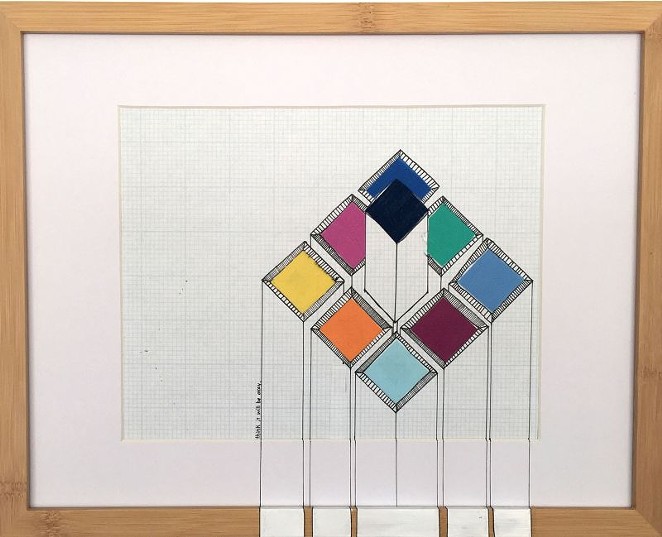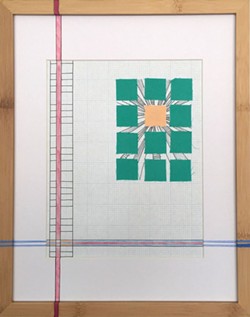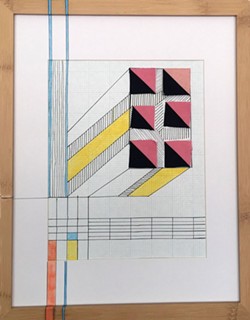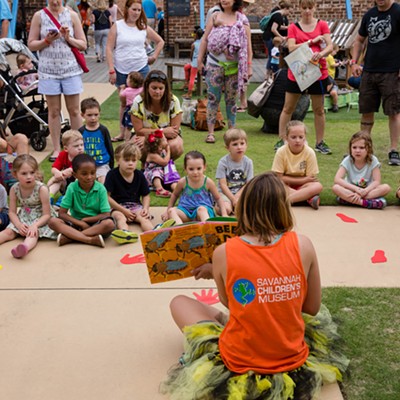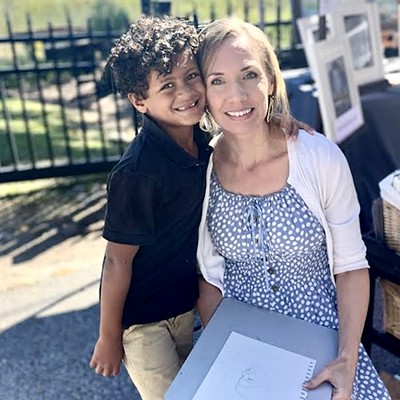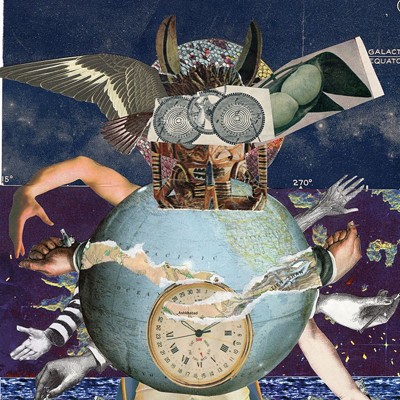AFTER graduating from SCAD in 2011, fibers artist Anya Mitchell volunteered at the Bahai World Centre in Israel.
“It was so fascinating and amazing,” Mitchell recalls. “I felt like I was really introduced to culture and sacredness, and how America has no sense of sacredness. I lived a ten-minute walk from Elijah’s cave. I was like, ‘This is the Bible. Is this a real place?”
Seeing Israel’s rich culture and heritage got Mitchell thinking about what gets preserved in a culture and why.
“I think a lot about history in all my work—connecting history, understanding it, bringing it forward,” explains Mitchell. “We get to make a choice of what we carry forward from previous generations. We need to sift through—what do we leave behind, and what do we bring forward?”
“Lineage,” up now at Starland Café through April 16, is Mitchell’s examination into what she wants to carry forward.
Done on graph paper, the geometric sketches use bright colors and fine line to build a dynamic world. She continues the lines off of the page and onto the frame to further symbolize our interconnectedness.
The pieces incorporate quilt squares from Mitchell’s grandmother, who grew up in an Amish community in Bluffton, Ohio.
“She was very active in Amish and Mennonite culture,” shares Mitchell. “When [my Mennonite ancestors] moved to the United States, they adopted quilting, but they purpose their own. They use their own clothing, so the palette of their quilts is different from American quilts at the time.”
Amish people aren’t permitted to create representational art, so the quilts they create are minimalist in style and geometric in shape. Many of the motifs they use are in reference to community or communal beliefs, like tumbling blocks.
“I have a large family, so we’d visit Grandma once a year,” remembers Mitchell. “It became very special to go visit her, and in her attic, there was her quilting studio.”
The quilting studio piqued Mitchell’s interest for years, even after her grandma’s death. Years later, when her aunt asked her if she wanted a box of Grandma’s quilting pieces, she jumped on the chance.
“I didn’t really touch them because I was scared to quilt them—I knew my skill level wasn’t there,” admits Mitchell. “I started to play with the arrangement and put my own line work with it, and repurpose it myself.”
Mitchell started the sketches, then moved to Israel and put the project down for a while. It wasn’t until she was offered her show at Starland Café that she decided to pick the project back up.
“I wanted to make the sketches and push it further and make some quilts,” says Mitchell. “The collages are on graph paper, so it does call to mind quilt work, especially with the pieces incorporated into it. But it was really fun, the process, because usually I’m really thought-out and I used this to explore. I wouldn’t put the pieces down and adhere them until I was ready to. It was a lot of play and finding my own voice with these pieces.”
The fun behind the process makes the project feel less like an obligation for Mitchell.
“I love doing this project. It feels endless to me,” she raves. “There’s lots of design and composition and color and lots of play. Letting myself play, letting the line work not be necessarily perfect, but just pushing it, too. What happens if this color is next to this? It’s just fun. With other projects, it can feel like a chore, like I should be doing this, but this is just uplifting for me. I could just keep doing it.
“There’s something about handwork or crafting or making art which is just really reflective, meditative in a sense,” she continues. “Sometimes, we don’t have that built in to our culture or the work we do on the daily.”
Mitchell touches on an important thought: when you’re crafting, you’re actively doing things with your hands that require attention and focus, and you’re not on your phone. Regardless of your age, penchant for technology, or level of pessimism, it’s exceedingly obvious that social media has created more vitriol, even in our face-to-face relationships.
“How do we listen to each other? How do we learn from each other?” Mitchell asks. “I think things will grow worse and worse until we do pause. It reminds me of why I continue to make. I found that during the process of making, I became stronger in myself.”
As it turns out, taking some time to craft quietly can lend a little introspection, as it did for Mitchell.
“I’m thinking about analyzing our communities, where we live, what systems are in place, and what we need to change,” says Mitchell. “What do we need to acknowledge that this happens so we don’t repeat it, but acknowledge that there are forces that created it so we can understand it deeper? Why are there systems in place that oppress people of color? We need to understand that, but we don’t need to continue it.”
Mitchell hopes above all that visitors to “Lineage” feel uplifted and positive. She plans to continue the project by making larger quilts.
“I’ll probably spend the summer researching and we’ll go from there,” she says. “I think I’ll continue quilting on the side and think about my grandpa and my grandma. We have records of their writing to each other during the war. There was this line where my grandpa says, ‘I can’t offer you much when we get married, our life won’t have all these material things, but we’ll have things people can’t take away from us.’ That’s something I would want to carry forward in my life and my lifestyle.”

